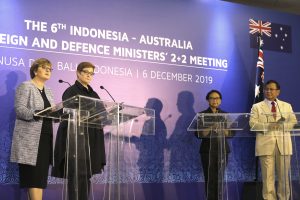The Australian and Indonesian foreign and defense ministers met last week in Bali for their sixth annual “two-plus-two” meeting. For Australia, the consolidation of the annual two-plus-two meeting is a reflection of its recent foreign policy and defense white papers, which stress the importance of Indonesia to Australia’s national security. For Indonesia, the enhancement of the relationship with Australia is an indication that it is beginning to make the shift from an insular state, concerned primarily with its own internal stability, toward becoming a powerful regional player, looking to enhance its cooperative architecture and regional responsibilities.
The meeting’s joint statement was notable for its forceful shift in language from last year’s version. There was an emphasis that “Australia and Indonesia’s strategic outlooks are converging as both seek to navigate a contested regional environment.” Recognizing the main contest in the region, the two countries expressed “serious concerns about developments in the South China Sea” and the “continued militarisation of disputed features.” Reiterating that any maritime disputes should be resolved peacefully in accordance with international law, particularly the 1982 United Nations Convention on the Law of the Sea (UNCLOS), the statement didn’t directly name China as the source of this concern. But it was obvious which country the comments targeted.
As island states, the defense of maritime norms is the most obvious area of convergence between the two countries. While Indonesia has repeatedly stated that it is a non-claimant in the dispute over the South China Sea, part of its exclusive economic zone (EEZ) emanating from the Natuna Islands falls within China’s vast maritime claims (the so-called nine dash line), making Jakarta wary of how forcefully China pursues its claims. Australia’s interests lie in its protection of key trade routes and a desire to defend against any attempts to overturn conventions that have proved both economically advantageous and guarded the region’s peace.
Being able to identify areas of mutual interest and find ways to cooperate with Indonesia has been a long-standing hope for Australia. As a large, complex, and potentially powerful country to Australia’s north, a close, trusting, and productive relationship with Jakarta is deemed a strategic imperative for Canberra. Yet despite some progress in recent years — with the establishment of the two countries’ Comprehensive Strategic Partnership in 2018 — the relationship has failed to mature in the way Australia would have hoped.
For Canberra, this is partly due to the Australian public’s disinterest in Indonesia (apart from Bali’s beaches), which prevents any ground-up domestic momentum in the relationship from developing. Added to this, state governments (which are responsible for education) and other public institutions in Australia show little inclination in trying to rectify this disinterest, with fewer students today leaving high school with practical Indonesian language skills than in the 1970s.
This problem is compounded by Indonesia’s consistent growth and burgeoning capabilities making Australia’s strategic imperative more pressing. Indonesia is now the seventh largest economy in the world measured by Purchasing Power Parity (PPP). Yet as Rod Lyon and Aakriti Bachhawat recently wrote for the Australian Strategic Policy Institute, the country is “probably surprised to find itself ranked in that position.” Indonesia is projected to maintain this trajectory to become the fourth largest economy (PPP) by 2030. Although Jakarta remains focused on its internal complexity and seems uninterested in or disinclined to use its increasing strength, this is bound to change as it becomes accustomed to its growing weight (Jakarta just created a foreign aid program in October, a significant sign that it is starting to think externally). Canberra will need to find ways to work with (and around) its neighbor’s increasing power.
Yet the stark reality that Canberra is facing is whether Indonesia actually needs Australia. Neither country is currently among the other’s 10 largest trading partners. Proximity has failed to produce complementary economies; instead the two countries have competitive economies. Many of the resources that Australia has relied upon to build its economic partnerships with developing (and developed) countries Indonesia also has in abundance. A benign Australia, with limited economic opportunities, may simply be inconsequential to a more powerful and more capable Indonesia, especially when Jakarta is bound to have more pressing concerns to its north.
For Australia this means there is a necessity to capitalize on its current advantage as a more active international actor to try and enhance bilateral security arrangements — to build habits of cooperation — so that as Jakarta’s capabilities increase they rise in a harmonious manner with Australia’s security interests. Australia’s security forces may be small in comparison to Indonesia’s, but they are sophisticated, technologically capable, and have significant experience with international deployments.
There are signs that this is the approach Australia is pursuing. The Indonesian armed forces (TNI) were invited to be an observer at this year’s Humanitarian Assistance and Disaster Relief (HADR) exercise Crocodile Response, conducted by the Australian Defense Force and the U.S. Marine Rotational Force that is stationed in Darwin. Significantly, at last week’s two-plus-two meeting in Bali, the idea was floated for a potential Australia and Indonesia co-deployment on a United Nations peacekeeping mission. This would greatly improve the interoperability of the two countries’ defense forces, but also — most importantly — build significant trust. Trust is a key element of the bilateral relationship that Australia must enhance if it is not going to be left in Indonesia’s rear-view mirror.
































